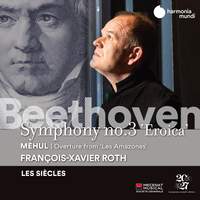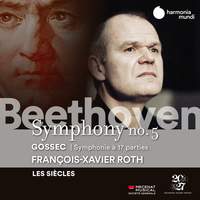Recording of the Week,
François-Xavier Roth conducts Beethoven's Eroica Symphony
After their outstanding account of Beethoven's Symphony No. 5 (a performance that easily made it into our Top Ten Recordings of 2020), François-Xavier Roth and his period-instrument orchestra, Les Siècles turn to Beethoven's other "revolutionary" symphony, namely the Third. The word "revolutionary" is equally applicable with both a small and a capital R: originally dedicated to Napoleon Bonaparte, the tribute was famously withdrawn by Beethoven in anger when he learned that Napoleon had declared himself Emperor, thus betraying the democratic ideals of the French Revolution, and the work was eventually published under the title of Sinfonia Eroica, with simply the allusion that it was composed to celebrate the memory of "a great man".
 It's easy to forget these days how groundbreaking the symphony was, pushing the conventions of the genre not just in terms of its length (indeed, one German review of an 1805 performance helpfully suggested that the symphony would "gain immeasurably" if Beethoven decided to shorten it), but also with its bold dissonances and rhythmic ambiguity. This is especially true of the first movement: with a multitude of off-beat sforzando accents and repeated chords, Beethoven frequently creates utter chaos, and it is this ambiguity that is brought out by Roth to magnificent, startling effect. Rarely have I so keenly appreciated these aspects of the symphony, and for Roth and his ensemble to capture that uncertainty to such a palpable extent is a remarkable achievement.
It's easy to forget these days how groundbreaking the symphony was, pushing the conventions of the genre not just in terms of its length (indeed, one German review of an 1805 performance helpfully suggested that the symphony would "gain immeasurably" if Beethoven decided to shorten it), but also with its bold dissonances and rhythmic ambiguity. This is especially true of the first movement: with a multitude of off-beat sforzando accents and repeated chords, Beethoven frequently creates utter chaos, and it is this ambiguity that is brought out by Roth to magnificent, startling effect. Rarely have I so keenly appreciated these aspects of the symphony, and for Roth and his ensemble to capture that uncertainty to such a palpable extent is a remarkable achievement.
Performing on period-appropriate instruments (or, where this was not possible, modern replicas) makes a huge impact as well, not only on the sound of the orchestra but also on the clarity of textures, aided by Roth's attention to detail (notably his scrupulous observance of the difference between forte and fortissimo). An obvious place to witness this is with the horns: with their lack of valves and the need to hand-stop certain notes, the feeling of an entire phrase can be substantially altered compared to a modern horn. This is most apparent in the horn trio during the symphony's Scherzo; where the natural instruments conjure up much more of a nod to their origins as hunting horns than their valved counterparts of today could possibly convey (an observation similarly noted by Roth himself when he spoke to my colleague Katherine about his Beethoven recordings earlier this year).
The previous release of Symphony No. 5 was paired with a piece by François-Joseph Gossec; here for the coupling we turn to another French composer, Étienne-Nicolas Méhul, and the overture to his opera, Les Amazones, ou La Fondation de Thèbes. Rarely performed or recorded these days, Méhul was actually one of the most important operatic composers in Revolutionary France, and there was undoubtedly mutual admiration between the two: Beethoven, for instance, is known to have possessed a score of Méhul's opera, Valentine de Milan. There is even a Napoleonic connection between the works recorded here, as the Emperor and his second wife, Marie Louise, were in attendance at the opera's premiere.
Beyond these associations, I can hear why Roth chose to couple this particular piece with the Eroica, as it sounds to me like a cross between the slow movement of that symphony and the overture to Mozart's Don Giovanni. Just as Beethoven explored new possibilities in his symphony, so Méhul makes striking use of trombones (I suppose technically I should say sackbuts, as those were the instruments used for this recording!).
The opera itself was not a success (apparently the premiere was beset with all sorts of problems, including a crucial moment where Jupiter was supposed to descend in a cloud chariot, thereby supplying the deus ex machina denouement of the whole opera, but the bass singing the part of Jupiter was chatting to someone backstage and missed his cue, so an empty chariot descended without him, thereby somewhat lessening the impact of the opera's conclusion). Such failure led to Méhul writing that he was "wounded, crushed, disgusted, discouraged!". If only he had had the musicians of Les Siècles on hand, I'm sure he would have been much happier! The orchestra crackles with energy throughout, and it makes for a thrilling coda to a most ear-opening recording of the Eroica.
Les Siècles, François-Xavier Roth
Available Formats: CD, MP3, FLAC, Hi-Res FLAC
Les Siècles, François-Xavier Roth
Available Formats: CD, MP3, FLAC, Hi-Res FLAC




